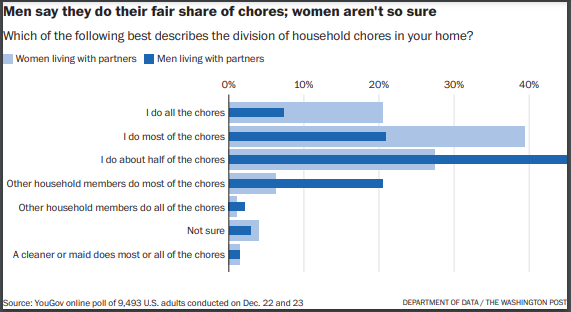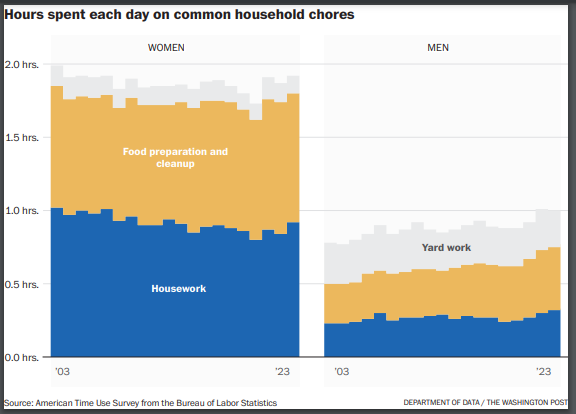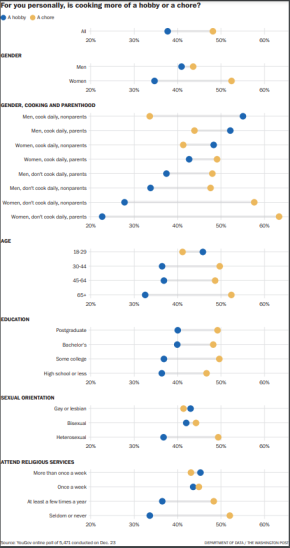When YouGov asked specifically if they did their fair share, 81% of men who lived with partners said they were confident they did
When people ask us about housework, they really want to know one thing: “Is it true that women really do more at home than men?»
That’s how Rob Molla asked the question in the Cape Cod town of Duxbury, Massachusetts. He continued by asking: “Is it something that has changed over time?»
Fascinating question, Rob!
For the answer, we turned to our pollster friend Taylor Orth at YouGov, who studied the division of household labor for her PhD. But its brand new December poll only raises more questions: 60 percent of women who live with their partner say they do all or most of the work. But 73 percent of men in a similar position say they do the most — or share the chores equally.
So, who do we trust?!
The best answer to this question is not “men” or “women”. It is “the Bureau of Labor Statistics”.
While they’re best known for sexier stats like the unemployment rate and nonfarm payrolls, our friends at the BLS also argue about the best long-term way to calculate our division of household chores. Every year, the American Time Use Survey asks thousands of Americans to report, in often hilarious detail, what they did every minute of a random day.
BLS data shows that, in 2023, adult women spent nearly twice as much time as their male peers on jobs. They cooked, cleaned and did yard work an average of 1.9 hours a day, compared to one hour for men.
Of course, a lot depends on what chore we’re talking about. Men spent twice as much time as women on yard work and all the activities we might classify as DIY: appliance, furniture and car repairs and home improvement. This may be why, when YouGov asked specifically whether they did their fair share, 81 per cent of men who lived with partners said they were confident they did.
However, women still dominate because they usually handle the most time-consuming jobs. But Rob and other curious readers are right to wonder about the change over time: Men are winning.
And it’s not like men spend more time mowing the lawn. Men’s extra drudgery time has come in traditionally female-dominated jobs, with cooking taking the lion’s share of the gains.
Why do men cook more? A theory began to flood and thrive in our brains: Maybe, depending on who you ask, cooking no longer qualifies as a chore.
Even as the time we spend on other jobs declines or falls, according to demographics, everyone is cooking more than they did in the 2000s. But the increase is not equal. The share of men who cook on a given day has grown twice as much as the share of women, and men have outnumbered women. Gains accelerate as we look at groups that are younger or more educated. Asians made the biggest jump of all.
Of course, mothers, retirees, Asians and Hispanics remain the most prolific fryers, poachers and boilers. But in recent years, people for whom cooking was traditionally optional – well-to-do men – seem to have embraced it more enthusiastically.
(Editor’s note: We omitted household chores related to child care, in part because only a minority of Americans have minor children. But we avoided the topic mostly because we’re sure it deserves an entire future column. More on that below.)
To understand the apparent transformation of cooking into a leisure activity, we tracked down Michelle Szabo, a sociology professor at Canada’s Sheridan College, not far from the shores of Lake Ontario, the lesser of the Great Lakes. Szabo grew up in a household that valued food as an expression of love, but also remained acutely aware of jobs and gender roles.
“My mom went on strike! He wrote it on the fridge. He was saying: ‘I’m on strike!’». Szabo waved her hands at Zoom’s window, imitating her mother. “She worked full time and also did all the housework. And my dad worked full time and didn’t do housework, really».
These observations planted a seed that would mature into her dissertation on the role of men in the kitchen. He sent us an article he had written, a miraculous document that answers all your questions about a decade before you even thought to ask them.
“When it’s no longer labor-intensive or absolutely necessary,” Szabo wrote, “cooking can become an enjoyable activity one chooses to do in one’s free time.».
The march of technology (and rising living standards) ensures that it’s getting easier and easier to prepare a meal. It’s not just electricity, plumbing and gas. You push a button and microwaves and deep fryers turn plastic bags of frozen calories into dinner. Prepared or prepackaged foods are found in the highest traffic aisles of every supermarket. And since the outbreak of Covid-19, many Americans depend on DoorDash drivers for daily grocery needs.
As home cooking has become optional, it has ‘broken’ its association with chore and acquired qualities of a recreational activity. Now, the upper classes — once amused by such impractical pursuits as fox hunting — flaunt $16,399 Miele cooktops in which they cook only the most organic local foods from the nearby market.
The same impulse has driven cookery shows from purely practical types – think Julia Child or Martin “Yan Can Cook” Yan advising viewers on cooking times and temperatures – to a televised “sensory spectacle” so exaggerated that, he writes Szabo: “Some scholars liken recent dietary media to pornography, as the pleasure is not in doing but in seeing».
Given this context, it may not be surprising that cooking-related activities dominate the list of happiest household chores, our analysis of BLS data shows. The only non-cooking job near the top of the happiness rankings? Knitting, another ancient chore that 21st century humanity has rediscovered as a form of recreation. In fact, the data shows that the meaning, happiness, and (low) stress you get from cooking closely matches what people report while doing arts and crafts.
We wanted to address this more directly, but the latest data on who considers cooking a chore versus a hobby was gloriously dated: a 2008 UK report on the rise of male chefs called The Emergence of the Gastrosexual.
Fortunately, YouGov’s Orth, moved by the festive spirit, was kind enough to update humanity’s knowledge on the subject with an extraordinary pre-Christmas survey which showed that most partner men or dads who cook every day consider it a hobby, while more women their counterparts who cook everyday consider it a chore. (It’s no coincidence that women are also more likely to cook every day, period.)
It also helped us quantify another of Szabo’s points: that the experience of cooking can be different for men, who are often not the primary home cook or childcare provider. Many have even created their own leisure-focused fiefdom in the backyard, he said – a point YouGov’s Orth confirmed with its finding that partnered men were about twice as likely as their spouses to cook outdoors at least half the time times.
They also seem to cook in less stressful situations. Our analysis of BLS data shows that female parents are more likely to cook with children around, while male parents are more than twice as likely to cook with the help of their spouse.
Szabo said women had to cook and their work in the kitchen was taken for granted, but that any kitchen work men did was considered a bonus. It even conveyed prestige. The male home cooks she spoke to about her research gave her “a real sense, with gay and straight men alike, that being able to cook was impressive to potential dates or sexual partners».
As a counterpoint, consider one of the least joyous jobs: laundry. Americans have not rushed to do more laundry, even though it has been made easier by advances in appliances and detergents, by fabrics resistant to wrinkles and stains, and by imported “fast fashion” so cheap that buying it can seem like a viable alternative. solution. washing.
Men are doing more laundry than in the past and women less, but the general trend is downward. (And no, it’s not because we spent more on laundry and dry cleaning services—our spending on such things has hit record lows.)
Even in these less pleasant jobs, however, we see that the men with the most secure position in society do the most. For example, while the women who do the most housecleaning are the ones with the least education, the men who do the most are actually the most educated.
All of which begs the question: At some future pinnacle of social progress, will tasks now considered hopelessly tedious—brushing out stains with a toothbrush, say, or scrubbing windows—turn into male leisure pursuits?
Source :Skai
With a wealth of experience honed over 4+ years in journalism, I bring a seasoned voice to the world of news. Currently, I work as a freelance writer and editor, always seeking new opportunities to tell compelling stories in the field of world news.













